| Article ID | Journal | Published Year | Pages | File Type |
|---|---|---|---|---|
| 83648 | Applied Geography | 2013 | 11 Pages |
•Examines spatial relationships between forest values and preferred uses.•Non-spatial forest preferences and values were consistent with participant mapping behavior.•PGIS translates philosophical preferences into place-specific values and preferences.
The management of multiple-use public lands such as national forests in the U.S. is controversial because of the wide range of potential uses and contested public values for these lands. Previous research on national forest values and management preferences examined these relationships non-spatially. The development of public participation GIS (PPGIS) and volunteered geographic information (VGI) systems provide new opportunities to assess spatial relationships between perceived national forest values and preferred uses. This research used empirical data collected from a PPGIS/VGI study for three national forests in California to examine spatial and non-spatial relationships between place-based forest values and preferred uses. The relationships suggest public participants translated some of their non-spatial forest values and preferences into behavioral choices when mapping place-specific values and preferred uses. The empirical relationships between place-based forest values and uses were generally consistent with previous survey research results. Positive, non-spatial attitudes toward extractive uses of national forests were correlated with participant mapping of economic values and related extractive uses, while nonmaterial forest attitudes were correlated with participant mapping of amenity values and conservation-related uses. Further, spatial preferences for extractive forest uses such as timber harvesting were mapped proximate to economic values, while nonmaterial spatial preferences were mapped proximate to amenity-related forest values. PPGIS offers the potential to translate philosophical and ideology-based national forest preferences into place-specific discourse about forest management activities where public accommodation may be more achievable.
